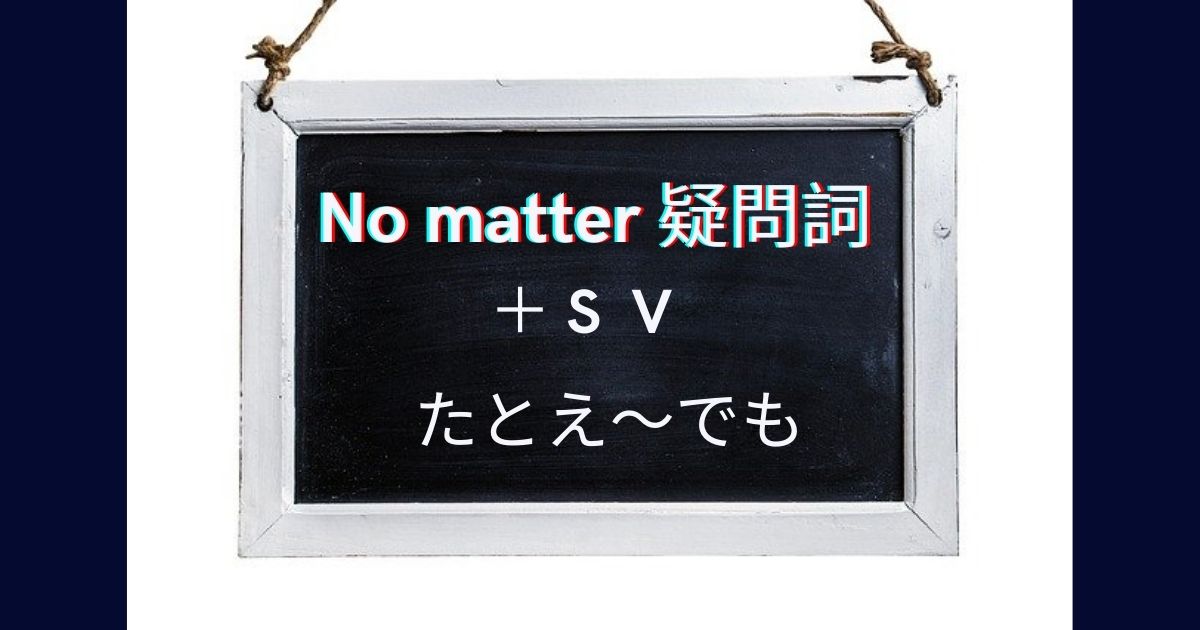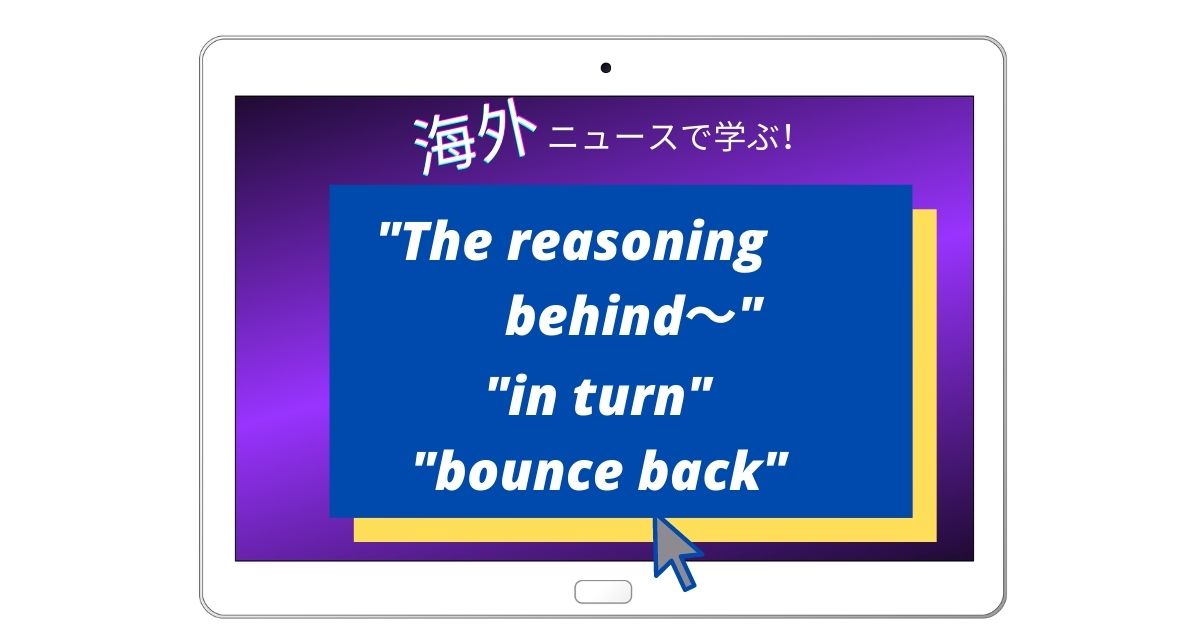熟語を学んでいると
「たとえ(何が、どこで、誰が…)〜しようとも」
と言う意味が登場します。
そもそも「matter」は日常会話でも頻繁に使われるのでまず基礎の意味からみていきます。
- 「matter」の品詞と使われ方
- 「no matter/it doesn’t matter + 疑問詞」が使われる状況
- 複合関係詞(wh-,how-ever)に置き換えられる。
- Wh-,how-ever(複合関係詞)が置き換えられないケース
- 疑問詞の後ろに来る品詞は?
- 「no matter /it doesn’t matter 疑問詞+ S+ V」の形
- 「no matter /it doesn’t matter 疑問詞 + V(動詞)」の形
- 「no matter how /it doesn’t matter how+ 形容詞+S +V」の形
- No matter (it doesn’t matter) where :どこであれ
- No matter (it doesn’t matter) who :誰であれ
- No matter (it doesn’t matter) what :何であれ
- No matter (it doesn’t matter) which:どちらでも
- No matter (it doesn’t matter) why :理由が何であれ
- 「no matter what」の後ろに S V がない場合
- 正式な文書やメールで使う場合の「たとえ〜でも」
「matter」の品詞と使われ方
名詞の「matter」
意味: 事柄、問題、事態、情勢
代表的な使われ方は
“What’s the matter, darling? Why are you crying?”
どうしたの?何で泣いてるの?
“Are there any other matters to discuss today, or shall we finish?
今日、他に議論することはありますか、それとも終わりにしましょうか。
“As a matter of fact, I’m very fond of her.”
実のところ、私は彼女のことがとても好きなんです。
引用:Cambridge dictionary
動詞の「matter」
では動詞の場合を見てみます。
肯定文「matter」の意味:「重要である」
It matters to me that my children should be polite to adults.
私の子供たちが大人に対して礼儀正しくすべきなのは私にとって重要なことなの。
引用:Cambridge dictionary
否定文で使われる「matter」の意味:「重要でない」「気にしない」
否定的な意味で使われる場合です。
詳しく説明された辞書を引用します。
The most common use of the verb matter is in the expression it doesn’t matter . It doesn’t matter means ‘it is not important’, ‘I don’t mind’ or ‘it is not a problem’:
最もよく使われる動詞の「matter」は “it doesn’t matter” と言う表現です。
意味は「重要ではない」「気にしない」「問題にしない」
引用:Cambridge dictionary
<例文>
It doesn’t matter if you can’t be here by nine o’clock. We can start without you and you can join us later.
もし君が9時までにここに来れなくても構わないよ。先に始めてるから後で参加すればいいよ。
さて、
☆名詞の意味「事柄、問題、事態、情勢」
☆動詞の肯定文の意味「重要である」
☆動詞の否定文の意味「重要でない」「気にしない」「問題にしない」
を理解しました。
「no matter〜」の「matter」は名詞か動詞か?

「no matter」は「it doesn’t matter」の省略形で
動詞だね。

「No matter(how, what,where,etc..)」のフレーズってよく使う?

いやー、僕はあんまり。。。 どちらかと言うと、「it doesn’t matter…」の方を使う。

意味は同じ?
どちらも「たとえ〜でも」

同じ意味だよ。 でも正式なメールや文書ではどちらも使わない。
カジュアルな会話やメールのやり取りで使うよ。
と言うことで英語の熟語表現は試験対策だけでなく
その熟語が
「どういう状況で使われるのか?」
「丁寧な表現なのかカジュアルなのか?」
「ネィティヴ自体、実際使う表現なのか?」(住む場所にもよる)
これらを知る必要があります。
では「No matter+疑問詞」及び「it doesn’t matter + 疑問詞」についてみていきます。
「no matter/it doesn’t matter + 疑問詞」が使われる状況
このフレーズが使われる背景には
変えがたい真実や状況のもとでも〜する!
例えば、
No matter /It doesn’t matterの後に続く例をあげると
what the wether is, どんな天候でも〜
how young you are, 年齢が若すぎても〜
how far away, 遠すぎても〜
what you say, 何と言おうと〜
このように変えがたい状況が背景にあります。

おっとここで同じ表現が頭に浮かびますね。
whatever, whoever, whichever…etc
譲歩節で使う「例え〜でも」
複合関係詞(wh-,how-ever)に置き換えられる。
「no matter / it doesn’t matter + 疑問詞 + S V」は
複合関係詞(wh-,how-ever)に置き換えて使われます。
<例文>
It doesn’t matter (no matter) what you say,
たとえあなたが何と言おうとも
↓ つまり
Whatever you say,
と同じ意味ですね。
:It doesn’t matter how, what, when, etc.
当たり前ですが、
「It doesn’t matter 疑問詞」=「wh-,how-ever」
つまり置き換えて使う事ができるんですね。
但し例外があります。
Wh-,how-ever(複合関係詞)が置き換えられないケース
逆に複合関係詞が使われた文から「no matter /it doesn’t matter+疑問詞+SV」に置き換えられない場合があります。
whatever, whichever, whoeverが名詞節になっている場合
上記3つは複合関係代名詞で副詞節にも名詞節にも使われます。
置き換えられるのは”副詞節”の時だけです。
例を挙げます。
副詞節(動詞を修飾する):「たとえ〜でも」
Whatever anyone says,I can’t give a phone to my child.
No matter what anyone says, I can’t give a phone to my child.
両方とも同じ意味
「たとえ誰が何と言おうと、私は私の子に携帯電話を与えられない。」
では置き換えられない”名詞節”をみてみます。
名詞節(名詞の役割を果たす):「〜する物(人)は何(誰)でも」
You can choose whatever you want.
あなたはあなたが欲しいもの何でも(←名詞節)選んでいいよ。
You can choose no matter what you want.
あなたはあなたが欲しい物が何であろうとも(←副詞節)選ぶ事ができる。❓❓❓
何とも変な意味に。。。
要するに名詞の役割を果たす節が動詞を修飾する節に変化してしまうので意味が変わってしまうんですね。
では次に「no matter/it doesn’t matter+疑問詞」に続く品詞をみていきます。
疑問詞の後ろに来る品詞は?
「no matter/it doesn’t matter +疑問詞」だけ覚えても文の構成を知らなければ使えません。
疑問詞の後に来る品詞のパターンも色々です。
代表的な構成を紹介します。
「no matter /it doesn’t matter 疑問詞+ S+ V」の形
「no matter /it doesn’t matter 疑問詞 + V(動詞)」の形
これは疑問詞自体が主語の場合ですぐ動詞がきます。
(It doesn’t matter〜に置き換えても同様です。)
「no matter how /it doesn’t matter how+ 形容詞+S +V」の形
特にhowを使った場合は「no matter(it doesn’t matter) how S+V」意外に形容詞を伴う表現が多々登場します。
(It doesn’t matter〜に置き換えても同様です。)
では「no matter/it doesn’t matter」に続くいろいろな疑問詞の例文をあげます。
No matter (it doesn’t matter) where :どこであれ
No matter (it doesn’t matter) where I am, I’m always thinking of you.
私がどこにいようともいつもあなたの事を考えています。
No matter (it doesn’t matter) who :誰であれ
No matter(it doesn’t matter) who you are, you can’t have it all.
あなたが誰であれそれを全て手に入れることは出来ない。
No matter (it doesn’t matter) what :何であれ
”あなたに何が起ころうともあなたを誇りに思うわ。”と私は言った。
No matter (it doesn’t matter) which:どちらでも
No matter (it doesn’t matter) which choice you make, you will get good results.
どの選択をしてもいい結果になるよ。
No matter (it doesn’t matter) why :理由が何であれ
No matter(it doesn’t matter) why the commission made that decision, we are bound to follow it.
委員会がその決定を下した理由が何であれ、私たちはそれに従う義務があります。
「no matter what」の後ろに S V がない場合
「no matter what」でひとかたまりの副詞句で使う場合です。
文末を締めくくるパターンで登場します。
この場合は「何が何でも〜する」と言う揺るぎない決意を象徴した意味でそのまま言いたい事の後ろに付きます。
I don’t care if it’s raining, I’m going to the concert no matter what.
雨が降っても構わないよ、何があってもコンサートに行くんだ。
引用:The free dictionary

次にあげる例文は実際にニュースで聞いた内容です。
〜父と娘がヨットが沈んでしまう悲劇にあい、助けを待っている間に交わした会話から父親がインタヴューで話した内容の一部です。
“There was no way I could give up. Stopping was not an option. I kept saying to her ‘we’re going to make it, no matter what’.”
「諦めるわけにはいきませんでした。 やめるという選択肢はありませんでした。 私は彼女に「何があっても切りぬけられるぞ!」と言い続けました。
引用:The Australian
文末「no matter what」と「no matter what happens」との違い
☆「no matter what happens,〜」何が起ころうとも〜する。
これは前述した「no matter 疑問詞(主語)+V」の形です。
具体的に「何が~しようとも」と条件を限定する用法。
仮にそうであっても〜すると言う意志表現です。
whatever happensと置き換え可能。
☆文末に置かれる「no matter what」何が何でも
ひとかたまりのフレーズ。
どんな決意を揺るがす要因があっても〜すると言う強い決意表現。
前述したように言いたいことの後ろに置いてその決意を表します。
We’ll be there on time no matter what.
我々は何が何でも時間までに到着します。
❌We’ll be there on time whatever.
主語、動詞がないのでwhateverとの置き換え不
可能。
正式な文書やメールで使う場合の「たとえ〜でも」
文頭で夫が説明したように「no matter/ it doesn’t matter +疑問詞」はカジュアルな使われ方です。
もし「たとえ〜でも」「〜に関わらず」と言う内容を正式な文書、メール、目上の人に伝える場合はどうしたらいいのでしょうか?
代表的なよく使われるフレーズを教えてもらいました。
regardless of 名詞(名詞節)と even though(or if) S + V
では同じ内容をカジュアル編とフォーマル編で表現します。

Are you going fishing tomorrow?
It looks like rain.
明日釣りに行く?雨降りそうだけど。

<カジュアル編>
It doesn’t matter(no matter) what the wether is, I’m going fishing!
どんな天気でも釣りに行くよ。
<フォーマル編>
Regardless of the wether, I’m going fishing.
天候に関係なく釣りに行きます。
or
Even though the wether looks rain,I’m going fishing.
雨が降りそうでも釣りに行きます。
もう一つ、例文をあげます。

Have you decided to attend the summer seminar?
夏期講習に参加するか決めた?

<カジュアル編>
Yes, I have to go no matter what.
うん、何が何でも行かなきゃ。
<フォーマル編>
Yes, regardless of what happens, I have to go.
はい、何が起こっても僕は行かなくてはなりません。
or
Even if I have something on, I have to go.
例えたくさんやる事があろうとも私は行かなければなりません。
or
Even though I have something on, I have to go.
たくさんやる事があるのですが行かなくてはなりません。

Even if something happens,とは言わない?

文法的にあっていてもネィティヴとしては言わない。
“Even if (though)の後は起こりうる(起こった)事が何なのかを伝えるから。
例えば”Even if it rains,”(雨が降ろうが)と言う事柄。
起こりうる(起こった)事が「雨が降る」と言う仮定や事実。
「何か起きること」を仮定としているのに
‘Something happens”(何か起きること)を使うのは変な感じなんだ。

言われてみれば。。。その通りです。
勉強になりました。
ポイント

もしセミナー主催者が保護者に積極的な参加を呼びかける文書を送るなら
「何があっても」と言う表現を避けるよ。
代わりにこんな感じの文。
Regardless of other events, please send your child to the summer seminar.
(Even though there are other events)
他の行事に関わらずどうかお子様を夏期講習に通わせてください。
さてここまで「no matter/it doesn’t matter 疑問詞 + S V」について紹介してきました。
そんなに毎日、どんな変えがたい状況であれ〜するぞ!と言う場面は実際のところありませんが使いこなせると表現法が広がります。



